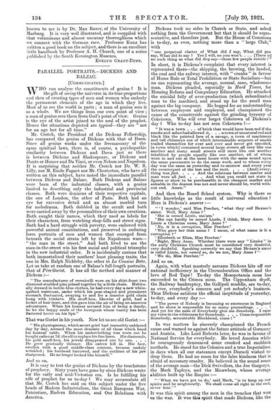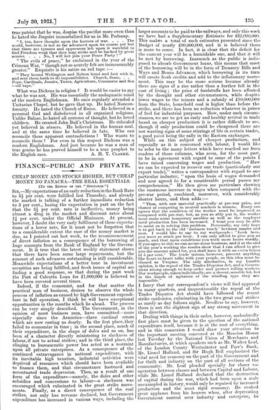PARALLEL PORTRAITS.—DICKENS AND BALZAC.
[COMMUNICATED.] WHO can analyse the constituents of genius ? It is the gift of seeing the universe in its true proportions and then of creating types of men and women who embody the permanent elements of the age in which they live. Most of us see the world in parts ; a man of genius sees it as a whole. We see things from our own point of view ; a man of genius sees them from God's point of view. Genius is the eye of the artist joined to the soul of the prophet. Hence the situations depicted are typical—they are pro? het.
for an age but for all time."
Mr. Crotch, the President of the Dickens Fellowship, has compared the genius of Dickens with that of Ibsen. Since all genius works under the freemasonry of the same spiritual laws, there is, of course, a psychopathic similarity between Dickens and Ibsen just as there is between Dickens and Shakespeare, or Dickens and Dante or Homer and Da Vinci, or even Nelson and Napoleon. It is surprising that neither Mr. Crotch nor Dr. W. S. Lilly, nor M. Emile Faguet nor Mr. Chesterton, who have all written on this subject, have noted the immediate parallel between Dickens and Balzac. Both Dickens and Balzac were born of the industrial classes, with a genius limited to describing only the industrial and provincial classes. Both were denizens of their respective capitals, the one of London, the other of Paris. Both had an eye for excessive detail and an almost morbid turn for melodrama. Both dabbled in the occult and both were carried away by the personalities of their own creations. Both caught their names, which they used as labels for their characters, from watching shop-bills and street signs. Both had a hard struggle with poverty, were endowed with powerful animal constitutions, and preserved in enduring form portraits of men and women that emerged from beneath the social strata left by the Napoleonic wars- " the man in the street." And both lived to see the man-in-the-street win his first social and political triumphs in the new industrial order. It is incidentally curious that both immortalized their mothers' least pleasing traits, the one in Mrs. Ralph Nickleby, the other in La Cousins Bette. Let us take at random one of Balzac's full-length portraits, that of Pere Goriot. It has all the method and manner of Dickens :— "The manufacturer of vermicelli wore on his shirt-front two diamond-studded pins joined together by a little chain. Habitu- ally dressed in bottle-blue clothes, he had every day a new white- quilted waistcoat, under which his pear-shaped and prominent stomach fluctuated, swaying to and fro a massive gold chain hung with trinkets. His snuff-box, likewise of gold, had a locket of hair inset, and this gave him the air of being an amorous adventurer. When his hostess accused him of being a dandy, he let the happy smile of the bourgeois whose vanity has been flattered hover on his lips."
That was Goriot in his youth. Now let us see old Goriot :— " His physiognomy, which secret grief had insensibly saddened day by day, seemed the most desolate of all those which lined his hostess' table. When his underclothing was worn out he bought calico at 7d. the ell to replace his fine linen. His diamonds, his gold snuff-box, his jewels disappeared one by one. . . . He grew gradually thinner. His calves fell in. His face, swollen with a good middle-class content, became unduly wrinkled ; his forehead furrowed, and the outlines of his jaw sharpened. He no longer looked like himself."
And so on.
It is easy to test the genius of Dickens by the touchstone of prophecy. Sixty years have gone by since Dickens wrote for the early and mid-Victorian era. Is he fulfilling his role of prophet for us to-day ? We may accumulate all that Mr. Crotch has said on this subject under the five heads of Modern Industrialism, the Great European War, Patriotism, Modern Education, and Our Relations with America. Dickens took no sides in Church or State, and asked- nothing from the Government but that it should be repre- sentative, and therefore just. But the House of Commons is to-day, as ever, nothing more than a "large Club," with "one perpetual clatter of What did I say, What did you say, What did he say ? Yes I will, no you won't. . . . [There is] no such thing as what did they say—those few people outside I" In short, it is Dickens's complaint that every interest is represented there—the shipping, the brewing, the landed, the coal and the railway interest, with " cranks " in favour of Home Rule or Total Prohibition or State Socialism—but no one representing the average, normal, sane, wholesome man. Dickens pleaded, especially in Hard Times, for Housing Reform and Compulsory Education. He attacked the suicidal folly of over-production (which subordinated man to the machine), and stood up for the small man against the big company. He begged for an understanding between employers and employed, and championed the cause of the countryside against the grinding tyranny d Coketown. Who will ever forget Coketown of Dickens's day ? Who to-day has not seen Coketown 1— " It was a town . . . of brick that would have been red if the smoke and ashes had allowed it, . . . a town of unnatural red and black like the painted face of a savage, a town of machinery and tall chimneys out of which interminable serpents of smoke trailed themselves for ever and ever and never got uncoiled, [a town which] contained several large streets all very like one another and many small streets still more like one another inhabited by people equally like one another, all of whom went in and out at the same hours with the same sound upon the same pavements to do the same work, and to whom every day was the same as yesterday and to-morrow and every year the counterpart of the last and the next. . . . [And] every- thing was fact. . . . And the relations between master and man were all fact. . . . And what you could not state hi figures or show to be purchasable in the cheapest market and saleable in the dearest was not and never should be, world with- out end. Amen."
And then the Board School system. Why is there so little knowledge as the result of universal education ? Here is Dickens's answer :— " I wonder,' said Miss Poacher, 'what they call Hexam's sister. Well, Mary Anne ? '
She is named Lizzie, ma'am.'
She can hardly be named Lizzie, I think, Mary Anne. Is Lizzie a Christian name, Mary Anne ? '
No, it is a corruption, Miss Peecher.'
Who gave her that name ? I mean, of what name is it a corruption ? '
Elizabeth or Eliza Miss Peecher.'
'Right, Mary Anne. Whether there were any " Lizzies " in the early Christian Church must be considered very doubtful, very doubtful. Speaking correctly we say that Hexam's sister is called Lizzie, not named so, do we not, Mary Anne
We do, Miss Peecher.' "
And so on.
Again, with what masterly sarcasm Dickens hits off our national inefficiency in the Circumlocution Office and the love of Red Tape ! To-day the Mesopotamia mess has succeeded to the Crimea mess. The Cippenham depOt, the Railway bankruptcy, the Gallipoli muddle, are to-day, as ever, everybody's concern and yet nobody's business. Thus Dickens satirizes the official ineptitude of yesterday, to-day, and every day :— " The power of Nobody is becoming so enormous in England and he alone is responsible for so many proceedings. . . . And yet for the sake of Everybody give me Somebody. I raise my voice in the wilderness for Somebody. . . . Come responsible Somebody, accountable Blockhead, come 1" In war matters he sincerely championed the French cause and warned us against the future attitude of Germany and Austria. Like Lord Roberts later, he was in favour of National Service for everybody. He loved America while he courageously denounced some crooked and snobbish methods. He stood for the Colonies and a true Imperialism in days when all our statesmen except Disraeli wished to drop them. He had no room for the false kindness that is afraid of necessary cruelty. He believed in the sound sense of the average man—the Dick Swivellers, the Joe Gargerys, the Mark Tapleys, and the Micawbers, whose average abilities built up the Empire :— " ' What we have got to do,' said Mark, is to keep up our spirits and be neighbourly. We shall come all right in the end, never fear.'" It was this spirit among the men in the trenches that won us the war. It was this spirit that made Dickens, like the true patriot that he was, despise the pacifist more even than he hated the Jingoist immortalized for us in Mr. Podsnap.
"I, too, have thought upon the horrors of war. . . . The world, however, is not so far advanced upon its course yet but that there are tyrants and oppressors left upon it watchful to find Freedom weak that they may strike and be backed by groat armies. . . . No, I will not join your Peace Party ! "
"The evils of peace," he exclaimed in the year of the Crimean War, "though not so acutely felt are immeasurably greater." Exquisite is his satire on red tape :— " They bound Wellington and Nelson hand and foot with it, and sent them forth to do impossibilities. Church, State, . . Pope, Cardinals, Jesuits, Taxes, Agriculture, Commerce and Sea —all tape."
What was Dickens in religion ? It would be easier to say what he was not. His was essentially the undogmatic mind of the modern Englishman. He once regularly attended a Unitarian Chapel, but he gave that up. He hated Noncon- formity. He hated the Church of Rome. He believed in a personal God and disbelieved in all organized religions. Unlike Balzac, he hated all systems of thought, but he loved children. He created John Bull's Christmas. He ridiculed yet believed in seances. He believed in the human soul, and at the same time he believed in fate. Who can reconcile these apparent contradictions ? Who wants to reconcile them ? For even in this respect Dickens was a modern Englishman. And just because he was a man of true genius he has proved himself to be a true prophet to



































 Previous page
Previous page